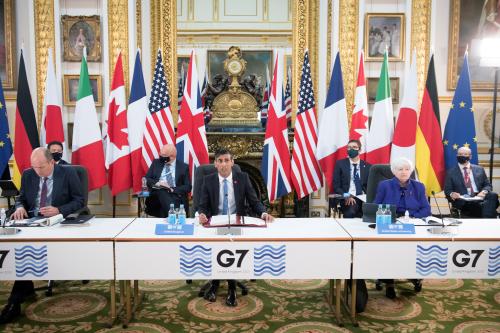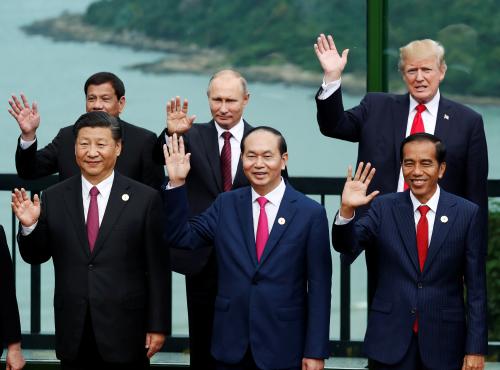The optics at the G20 summit in Hamburg were striking. On the one side, the United States. On the other, 18 nations and the European Union. While the dividing issue was climate change, for many, this symbolized something larger. In a video that instantly went viral, Chris Uhlmann of the Australian Broadcasting Corporation put it pithily: “The G20 had become the G19 plus one.” The United States had abdicated its global leadership role and the rest of the world stood aghast, united as one, it seemed.
That’s a compelling picture, but one that obscures more than it reveals. There is no G19; there is no united front. It is true that Trump was utterly isolated on climate change. And yes, the United States is questioning the merits of the international order it created and continues to benefit from. But the divisions in the G20 run far deeper than frustration with Trump: The body itself is a vestige of a world that no long exists.
The assumption underpinning the G20, which took hold in the 2000s, was that all major powers were converging around a single model of liberal international order. As they traded and interacted with each other, the thinking went, they would become “responsible stakeholders” in that order, sharing challenges and limiting their geopolitical differences. Over time, they would liberalize their political and economic systems, even if some fell short of fully fledged liberal democracy.
The apex of this convergence occurred in late 2008. As the world reeled from the worst financial crisis since the 1930s, the United States hosted the first G20 leaders’ summit, recognizing that all member states had a shared interest in averting economic catastrophe. Hopes were high that the G20 could expand its remit to global security and transnational challenges.
Since then, the geopolitical story has been the dissolution of this global consensus—convergence replaced by divergence. In recent years, a rising Russia and China have come to see the liberal order as a threat and pushed back against it, both domestically and internationally. Globalization went from promising prosperity for all to representing stagnation and outsourcing. Hopes of progress in the Middle East faded after the Iraq War and the failure of the Arab Awakening. Starting in the Obama years, Americans began to question whether they should bear the brunt of the burden of global leadership.
Broadly speaking, the world now seems to be dividing into three camps, both between and within the major powers. The first camp, the Restorationists, want to return to the way things were. They want the United States to once again embrace the mantle of global leadership, and for European nations to integrate further. They believe in globalization and multilateral cooperation. They are usually on the center-left and the center-right in western nations. Emmanuel Macron, Angela Merkel, and Shinzo Abe, all reside in this camp.
The second camp, the Revisionists, wish to tear down the old order and replace it with something new. The Russians want to see a 19th-century-style great-power concert based around spheres of influence. The Chinese also covet a regional sphere of influence, although, unlike the Russians, they have a stake in maintaining the global economic order. Then there are those in the west on the far right and far left who want to bring globalization to an end and dissolve the U.S.-led system of alliances.
In the third camp are the Populists. They want to do less to uphold the international order and focus on a far narrower set of national interests. They tend to blame other nations for their problems. They seem comfortable with the demise of many elements of the order—trade pacts and security commitments—but they do not seek to replace it with anything else. Riding the global wave of nationalist sentiment, they want to do less and get more. Their ranks include Trump, Britain’s pro-Brexit politicians, an increasingly authoritarian Turkey, as well many others within western societies from Bernie Sanders on the left to Ted Cruz on the right.
The world had begun to diverge along these lines well before November 8, 2016. Prior to the U.S. presidential election, the massive Trans-Pacific Partnership and Transatlantic Trade and Investment Partnership were in trouble. China was seeking to expand its influence in the South China Sea. Russia had annexed Crimea. And the European Union was facing an existential crisis. The United States was pushing back—insufficiently perhaps, but pushing back nonetheless. Obama sought to impose costs on Putin’s Russia, promoted free trade, and spoke out against spheres of influence. All this largely ended with the election of Trump. He sought friendship with Russia, pressured U.S. allies, threatened to launch a trade war, and all but said that the days of American leadership of the international order were over.
Trump’s election confirmed that the era of convergence is at an end. Now, the world is trying to figure out just how weak or resilient the international order is. They know that Trump is a critic but they also know that he is constrained by more mainstream members of his cabinet and by various treaty obligations and troop deployments. They think the status quo is unsustainable, but they don’t know how it could come to an end. The Revisionists don’t want to act prematurely and run the risk of isolation, counter-reaction, and failure. With such a volatile and indecisive U.S. president, the initial impulse is caution. And yet, the initial unraveling has begun in earnest.
The G20 summit in Hamburg offered a glimpse of the future. Suddenly, gone were the days when observing the G20 was like watching paint dry. This time, the leaders debated fundamental questions of whether the global economy should remain open or closed. They argued about climate change. They nervously watched as Trump tried to forge a partnership with Putin. Xi Jinping, the president of China, tried to position his country as a more responsible power than the United States while Putin took center stage. The Europeans, meanwhile, tried to preserve some semblance of transatlantic unity.
One of the more striking elements of the summit was the sense that, under Trump, America is far less capable than usual. Much has been made of the failure to appoint senior officials at the State Department and Pentagon, and of the dysfunction within the White House. The strain is starting to show. The Trump administration made a litany of errors in Germany, both small and large, that raised real doubts as to its competence. The most egregious was the meeting with Putin where Trump agreed to create a joint U.S.-Russian task force on cyber security, an idea that did not survive 24 hours. Secretary of State Rex Tillerson’s read-out on the rest of the discussion was unintentionally damning. He spoke about how the United States and Russia shared the same objectives, how they wanted to move past the election hacking to focus on the future, and how Putin may have the right solution to end the war in Syria. Trump and Tillerson had Russia experts and experienced national security professionals on hand, yet inexplicably excluded them from the meeting.
Equally damaging: There was no G20 statement on North Korea’s increasingly bellicose threats and actions. Had Trump pushed for it, it is highly likely that he could have secured an agreement to contain the Kim regime. Instead, he accepted without argument Russia and China’s objections that the G20 should not deal with security matters.
There are, of course, the lower-order flubs, too—largely matters of optics, but still of consequence: a press release that confused China (formally, the People’s Republic of China) with Taiwan (formally, the Republic of China); Ivanka Trump sitting in for her father at the G20 table, reinforcing the narrative that her father’s administration is a family-run business. Tellingly, Trump broke with tradition and did not hold a post-summit press conference. One likely explanation is that his staff worried about what he might say, particularly regarding his meeting with Putin.
The message of Hamburg, like Trump’s trip to Saudi Arabia, is that it is possible to manipulate a gullible U.S. president. Every meeting with him is a strategic opportunity. This is now the game other nations are playing.
Over the next five years, the character and tempo of this new era of strategic competition will come into focus. Contrary to widespread belief, major conflict between the great powers is unlikely. Russia and China have no intention of fighting the United States directly—in fact, the reverse is true. The cost is too high. Instead, we will see nations compete with all measures short of war to achieve their objectives, including economic tools like sanctions, tariffs, and trade agreements; cyberwarfare of the type pioneered by Russia and China; proxy wars like the Syrian civil war; formal and informal alliances; coercive diplomacy; and soft power. The fact that the world is interconnected makes many of these weapons even more effective than they would otherwise be.
Each of the three camps has major decisions to make. Restorationist governments must decide whether they will fill part of the vacuum left by the Trump administration. But make no mistake: it will be a heavy lift, including in a Europe that remains deeply divided over the future it wants. In the United States, Restorationist politicians and foreign-policy advisers will have to make the case to the American people for why the country should return to a traditional internationalist foreign policy. It won’t be easy. The issue is whether they can regain the American presidency and if it will then be possible to course correct. The Restorationists will need to reflect on what they could have done differently over the past decade, how a future president could reverse the unraveling of the international order, and how internationalism benefit—and be seen to benefit—all, not just the elite.
The Revisionists must decide how much they want to test America’s resolve. It’s widely believed that Xi is playing it safe as the 19th Party Congress approaches, but he may grow more assertive in 2018. However, the U.S. alliance system in Asia remains intact and there are strong anti-China impulses in the White House. Any bold Chinese move could backfire. But Putin remains the biggest question mark. While he achieved his objectives in Hamburg, a true partnership with the United States is still out of reach, not because Trump is skeptical of him, but because he is too weak to deliver on it. Once his reelection in 2018 is out of the way, Putin will have to decide whether to capitalize on Trump’s ambiguous stance on the international order, and make a big play to accomplish something that could not be reversed by a future U.S. president, such as breaking NATO.
The Populists also have choices. They want to have their cake and eat it to—doing less, but without suffering the consequences—but life does not work like that. If Trump succeeds in imposing his America First worldview on U.S. foreign policy, he will be confronted with one horrible choice after another as the international order fractures on his watch. The easier path may be to listen to his secretary of defense, national security adviser, and chief economic adviser, and hold the line. They also have to decide to recognize Russia for what it is—a geopolitical competitor to the United States—or to continue to follow the siren song of partnership. At some point, Trump will also be confronted with a harsh reality on the economic front—in the 21st century, it is impossible to have a healthy national economy without a healthy global economy. Beggar thy neighbor policies will not work, especially in an economic crisis.
Above all, Americans need to understand that the post-Cold War era is over. The problem is not just Trump’s nationalism. It is that the very idea of convergence, which the G20 symbolizes, has been pulverized under the strains of the global recession, the failure of the Arab Awakening, Russian and Chinese revisionism, and western populism. Fundamental questions about the future of international order are back on the table. The world’s largest nations still need to cooperate but it will be much more difficult than before. Events in Hamburg were just a taste of what is yet to come.
The Brookings Institution is committed to quality, independence, and impact.
We are supported by a diverse array of funders. In line with our values and policies, each Brookings publication represents the sole views of its author(s).









Commentary
The new world divide
July 12, 2017